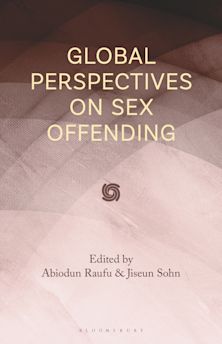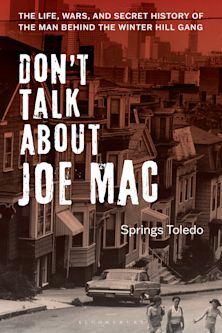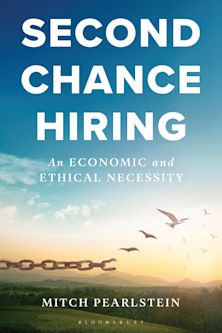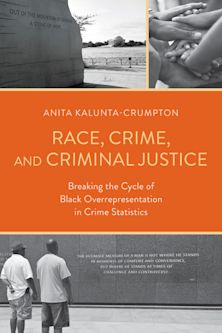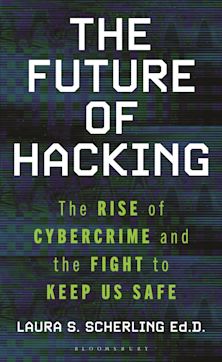- Home
- ACADEMIC
- Criminology
- Criminology - Other
- Good Trouble
Good Trouble
How Deviants, Criminals, Heretics, and Outsiders Have Changed the World for the Better
Good Trouble
How Deviants, Criminals, Heretics, and Outsiders Have Changed the World for the Better
You must sign in to add this item to your wishlist. Please sign in or create an account
Description
This book is written in praise of the criminal; a unique kind of criminal, who is motivated not by personal gain, but ethical altruism. Deviant heroes are those individuals who violate unjust norms and laws, facing the repercussions of social control, effecting positive social change in the process. Using a method that examines how the biographies of individual deviants intersected with history, it probes how criminals and deviants have been on the leading edge of important, positive social changes and the creation of a more just, fair, and humane society. Brian Wolf concludes with an examination of the problem of conformity and how deviant heroism in everyday life may be a remedy for injustice in micro-level social contexts.
Table of Contents
Chapter 1: Deviant Heroism
Chapter 2: Good Trouble in the Sociological Tradition
Part II: Good Trouble against Inequality
Chapter 3: Creative Maladjustment: The Words and Actions of Martin Luther King Jr.
Chapter 4: Disciplined Nonconformists: The Struggle against Racism
Chapter 5: Heretics: Women in Good Trouble
Chapter 6: The Agitators: Labor Trouble
Chapter 7: Truth-Tellers
Chapter 8: Deviant Peacemakers, Lovers, and Dreamers
Part III: Good Trouble and the Individual
Chapter 9: Complicit Conformity
Chapter 10: Good Trouble in Everyday Life
Product details
| Published | 24 May 2019 |
|---|---|
| Format | Ebook (Epub & Mobi) |
| Edition | 1st |
| Extent | 208 |
| ISBN | 9781498563451 |
| Imprint | Lexington Books |
| Publisher | Bloomsbury Publishing |
About the contributors
Reviews
-
In Good Trouble, Wolf (criminology, sociology, Univ. of Idaho) argues that there are times when deviant behavior results in positive social change. The initial chapters delve into this topic with a discussion of heroic deviance, in which norm breaches result in veneration of the deviant, as in the examples given of iconic individuals involved in the 1960s Civil Rights Movement. . . The strength of this volumeis two-fold pedagogically. It forces readers to think differently about the definition of “deviance,” especially “positive deviance,” which might yield positive norm change. It also offers ways of teaching deviance in a new light, with suggested class assignments.
Summing Up: Recommended. Graduate students and faculty.Choice Reviews
-
Good Trouble expands the field of deviance to recognize the power and often heroic nature of ethical altruism, disciplined nonconformity, and those who resist norms and break laws in the name of truth, justice, and equality. The book, using case studies, provides a social accounting of history that recognizes the great debt owed to our deviant heroes, those willing to break the rules, risk arrest and often their lives, in the name of progressive social change and resistance to oppression. Good Trouble is timely, relevant, and accessible to students of all ages and backgrounds. A must read for deviance scholars.
Terressa A. Benz, Oakland University
-
A fascinating take on the 'creative side' of the sociology of deviance and crime, and very timely too! Wolf's book provides a breath of fresh air in a field dominated by stuffy, cop-shop criminology. One of the real strengths of this study is its use of detailed case studies to exemplify each of the main types of 'heroic deviance,' including civil rights leaders like Martin Luther King, and many others who have engaged in 'good trouble' to achieve progressive social change.
Michael Blain, Boise State University, author of Progressive Violence: Theorizing the War on Terror
-
A thoughtful and productive sociological perspective on how those persons thought of as deviant or even criminal, but who are motivated by ethical altruism, can contribute to positive changes in society. Using the concepts of deviant heroism and a special kind of criminal, Brian Wolf focuses on numerous individuals and social movements that have created important social changes in this country. He discusses, for example, Martin Luther King, Jr., Rosa Parks, and John Lewis and the civil rights movement; Susan B. Anthony, Margaret Sanger and women’s movements; and Joe Hill and Cesar Chavez and labor movements. These monumental people and events are seen here through a new lens, providing insights into modes of social activism which can help to overcome our current divisive political and cultural contexts, and continuing structural injustices.
Eric L. Jensen, University of Idaho

ONLINE RESOURCES
Bloomsbury Collections
This book is available on Bloomsbury Collections where your library has access.













